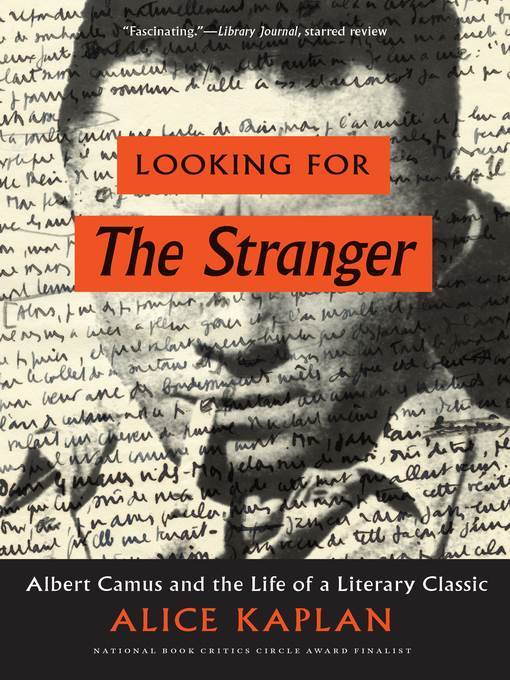
Looking for the Stranger
Albert Camus and the Life of a Literary Classic
کتاب های مرتبط
- اطلاعات
- نقد و بررسی
- دیدگاه کاربران
نقد و بررسی

May 30, 2016
Kaplan (Dreaming in French), a professor of French at Yale, persuasively retells the story of writer Albert Camus and his classic first novel, The Stranger. She explores Camus’s inspirations and influences (including James M. Cain’s The Postman Always Rings Twice), themes, and distinctive writing style. She also charts the feedback he received from mentors and from literary lions such as André Malraux. The road to publication was made difficult by WWII, which created impediments such as a shortage of quality paper and German-imposed censorship. However, Camus was bolstered by the support of the French intellectual and publishing elite, who were intrigued by the emergence of a new talent from a poor neighborhood in Algiers. Most fascinating are the chapters recounting the years after The Stranger’s 1942 publication, as the novel’s popularity took it well beyond Camus’s grasp. Kaplan provides fascinating tidbits of information, such as why the novel is called The Outsider in the U.K., and explains how this seemingly simple story became a prime example of French literature to be examined, dissected, and loved by readers, students, and teachers for generations.

Starred review from September 1, 2016
Kaplan (French, Yale Univ.; Dreaming in French) notes that Albert Camus's The Stranger, a coming-of-age story typically read in high school or introductory college courses, is often taken for granted, despite its literary significance. The author addresses this oversight with this title, which she designates a biography of the work. Kaplan examines the evolution of The Stranger from its inception when Camus struggled with the writing to its publication in 1942 and eventual acceptance into the French literary canon. It became the highest-selling paperback in French publishing history and contributed to Camus's Nobel Prize win. The well-researched analysis considers the various elements that influenced the prose, including Camus's educational background, his experiences in colonial Algerian courtrooms, and his witnessing a beach brawl similar to the one described in the novel (that fortunately did not result in a murder). Kaplan's description of the route the manuscript took to reach publishers in occupied France is particularly fascinating, as is the chapter in which she finds the family of the Arabic man involved in the scuffle that Camus witnessed decades before. VERDICT This engrossing book will attract readers interested in 20th-century French literature.--Erica Swenson Danowitz, Delaware Cty. Community Coll. Lib., Media, PA
Copyright 2016 Library Journal, LLC Used with permission.

July 15, 2016
The fascinating story behind Albert Camus' coldblooded masterpiece.Ever since its 1942 publication, The Stranger has been a murder mystery in more ways than one: we know whodunit, we just don't know why. The narrator, Meursault, is a killer without a motive; after the unprovoked shooting of an Arab, he goes to trial offering neither remorse nor defense and awaits execution in a jail cell consoled only by his bull-headed refusal to play his designated role. In this swiftly told, deeply researched literary investigation, Kaplan (Dreaming in French: The Paris Years of Jacqueline Bouvier Kennedy, Susan Sontag, and Angela Davis, 2012, etc.) pieces together the creation of the novel, its connection to colonialism, and how it has been interpreted ever since. The plot evolved from both notebook jottings ("Story: the man who doesn't want to justify himself") and events Camus witnessed as a reporter in Nazi-occupied Algeria; the spare, simple style was the result of years of painstaking rewriting. The first critics noted traces of James M. Cain and Franz Kafka, and Jean-Paul Sartre saw, or imagined, only the influence of himself and wrote a critique that turned The Stranger into the book that introduced existentialism to the West. (Camus, for his part, thought the book "anti-existentialist.") Kaplan can be overly effusive at times--it overstates the case to say the novel "would change the history of modern literature"--but she assembles the facts with astute narrative skill. She is driven by the novel's many abiding puzzles: who or what does Meursault represent? Is he a man who finds his own solipsistic integrity in the face of an irrational universe, or is he just a callous sociopath? While she doesn't offer any final interpretation, her detective work deepens the understanding of a work whose power resides as much in what it doesn't say as what it does. A compelling companion to a novel that has stayed strange.
COPYRIGHT(2016) Kirkus Reviews, ALL RIGHTS RESERVED.

October 15, 2016
Kaplan's (Dreaming in French, 2012) brilliantly crafted, thoroughly researched, and utterly engaging investigation into Albert Camus' The Stranger combines biography, literary history, and close reading to chronicle its journey from nearly abandoned manuscript to first publication and tepid reception to, finally, widespread recognition. Kaplan expertly situates Camus' rise as a writer at the heart of emerging European crises during the 1930s and '40s, from radical shifts in public opinion to increasing opposition to colonial occupation and the terrifying ascent of Nazi Germany. She draws on Camus' correspondence, newspapers, and literary reviews as well as the novel itself. The result is a riveting history of the novel's genesis, from its author's early days as a tubercular journalist struggling to make ends meet to his glamorous association with intellectual legends like Jean-Paul Sartre, Jacques Lacan, and Pablo Picasso. Kaplan concludes with The Stranger's lasting impact on literature by pointing to The Meursault Investigation (2015), a recent novel by Algerian writer Kamel Daoud, which retells Camus' novel from the point of view of an Arab whose brother was murdered by Camus' protagonist.(Reprinted with permission of Booklist, copyright 2016, American Library Association.)

























دیدگاه کاربران